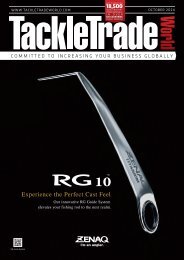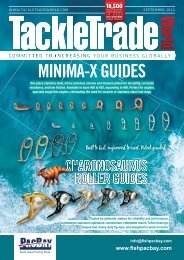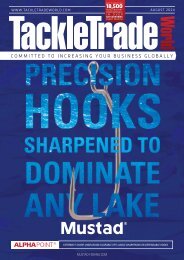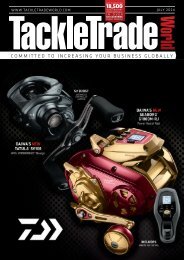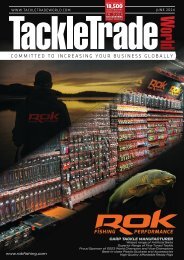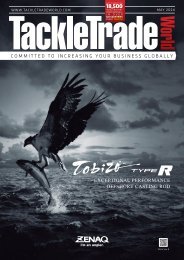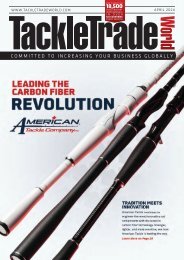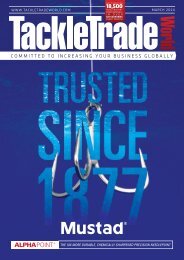Create successful ePaper yourself
Turn your PDF publications into a flip-book with our unique Google optimized e-Paper software.
SECTOR SPOTLIGHT ENERGY PRODUCTS<br />
lasting and more efficient when<br />
expending their stored energy.<br />
And lastly, they are much smaller<br />
and lighter <strong>–</strong> they can pack<br />
way more power into a much<br />
smaller size than traditional<br />
batteries, which is perhaps where<br />
they really come into their<br />
own when being installed in<br />
campervans, caravans and other<br />
RVs. This market has exploded<br />
to such a degree that there are<br />
several companies out there<br />
who have grown exponentially<br />
off the back of creating highquality<br />
LiFePO4 products <strong>–</strong><br />
LIONTRON, Bosswerk, and<br />
Super B to name just a few.<br />
It’s not just portable power<br />
that has come a long way in<br />
recent times, so have more<br />
sustainable ways to produce your<br />
own energy off grid too. Solar<br />
panels have gone from gimmick<br />
to highly usable in the RV and<br />
camping world, with smaller sizes,<br />
more efficient power generation,<br />
and more affordable prices.<br />
In fact, many portable power<br />
packs have built-in solar panels<br />
to help accelerate or elongate<br />
the amount of power they can<br />
deliver in an off-grid situation.<br />
There are even companies who<br />
merge the oldest technology with<br />
the new: Bio Lite has an amazing<br />
campstove that allows you to<br />
generate electricity and charge<br />
a small battery from a fire using<br />
natural materials.<br />
The possibilities for these kind<br />
of products within camping are<br />
growing all the time, especially<br />
with more and more people<br />
Global interest in Google search term ‘Portable power’ & ‘<strong>Camping</strong> battery’ in the last year<br />
100<br />
75<br />
50<br />
25<br />
31OCT<br />
2021<br />
spending more and more time<br />
in their campers. The idea that<br />
people are enjoying more nomadic<br />
lifestyles for at least some part of<br />
their years means that they need<br />
to be connected and fully powered<br />
when not at home, creating an<br />
even bigger demand for energy<br />
products. It’s not just about being<br />
able to post the odd picture on<br />
social media anymore, some<br />
people rely on these products to be<br />
able to live and work on the road<br />
<strong>–</strong> something that is becoming<br />
20 FEB<br />
2022<br />
Top five countries with highest<br />
Google search interest for the term<br />
‘portable power’ in last year<br />
South Africa<br />
Puerto Rico<br />
China<br />
New Zealand<br />
Australia<br />
Portable power<br />
12 JUN<br />
2022<br />
Top five countries with highest<br />
Google search interest for the term<br />
‘camping battery’ in last year<br />
Australia<br />
New Zealand<br />
United Kingdom<br />
Ireland<br />
Canada<br />
more common all the time. In<br />
fact, when you think about it,<br />
camping is the perfect market to<br />
help power and energy product<br />
companies push themselves to<br />
be more innovative. The natural<br />
challenges faced by campers<br />
when they are out enjoying<br />
their pastime alongside their<br />
attitude towards protecting and<br />
conserving the environment.<br />
is the perfect situation for new<br />
challenges to be solved by smart<br />
and clean energy products.<br />
<strong>Camping</strong> battery<br />
2 OCT<br />
2022<br />
WHAT THE EXPERTS SAY<br />
Why LiFePO4 batteries are<br />
better than lead, according to<br />
LIONTRON.<br />
When considering the<br />
costs over the period of use,<br />
lithium batteries are less<br />
expensive than lead batteries.<br />
Persistent deep discharging<br />
of more than 50 per cent is<br />
not recommended with lead<br />
batteries, because the number<br />
of possible cycles is decreased<br />
disproportionately strong.<br />
In contrast to that a Lithium<br />
battery may be discharged<br />
up to 90 per cent regularly<br />
without causing any troubles<br />
or altering the number of<br />
cycles. Thus, a 100Ah lithium<br />
battery can usually replace<br />
a 200Ah lead battery. Lead<br />
batteries decisively lose<br />
capacity after a maximum of<br />
800 charging cycles. Contrary<br />
to this, a LiFePO4 Battery<br />
manages up to 3,000 charging<br />
cycles putting on a convincing<br />
performance with the<br />
following 7,000 cycles, too.<br />
In conclusion, a LIONTRON<br />
lithium battery persists at least<br />
as long as three lead batteries,<br />
even when used intensively.<br />
With regard to weight, lithium<br />
batteries should be the<br />
preferred choice in contrast to<br />
lead batteries. A conventional<br />
100Ah lead battery weighs<br />
about 32 kilograms. A lithium<br />
battery of the same capacity<br />
weighs a mere 14,5 kilogram.<br />
Thus, the weight reduction<br />
is more than 50 per cent. If a<br />
200Ah lead battery is replaced<br />
by a 100Ah lithium battery, the<br />
weight saving doubles again.<br />
www.liontron.com<br />
www.campingtradeworld.com | 47




